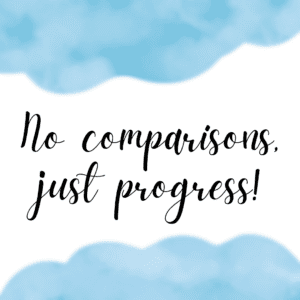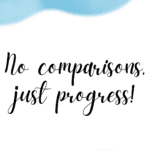The Perks of Tracking Your Personal Progress
Track “what counts” with this easy-to-follow guide to personal progress.
Defying Unrealistic Expectations
Many people set the bar too high when it comes to tracking their personal progress. They expect to see immediate changes and get discouraged when they don't. This can lead to a subtle but harmful cycle of setting hard-to-do goals, failing to meet them, and then feeling defeated.
Take Kym for example:
Kym used to be a person who would scroll through social media and feel like she was constantly bombarded with images of perfect bodies and healthy lifestyles. She would compare herself to these people and feel like she was never good enough. Kym would start diets and exercise programs but always give up after a few weeks. She felt like she was in an ongoing battle with her own body and mind.
Social media’s popularity, diet culture, and the fitness industry have cultivated an environment in which maintaining healthy habits can feel like an uphill battle. The constant barrage of picture-perfect influencers and “this is what beauty looks like” marketing campaigns has left many people feeling overwhelmed, disheartened, and in constant catch-up mode.
It's time to defy unrealistic expectations and focus on self-improvement in a way that meets you where you are.
By setting achievable goals and tracking your progress, you can break this cycle and start making meaningful strides in your journey toward better health and happiness.
Tracking Your Personal Progress is Cooler Than Instagram
Platforms like Instagram often show a carefully curated version of reality, they are inspiring while simultaneously breeding really high expectations. This idea of perfect can negatively affect mental health, self-esteem, and personal definitions of progress.
Steering Clear of the Comparison Trap
The danger lies in comparing your personal progress to the highlight reels of others. The pressure to measure up to all too-perfect standards can lead to feelings of inadequacy and decrease your motivation. By shifting your focus to your own unique journey and prioritizing progress markers that mean something to you, you can redefine your narrative.
Breaking the Vicious Cycle of Instant Gratification
Social media thrives on instant gratification. It likes to promote a never-ending quest for people to approve of you. This can make it difficult to stay committed to healthy habits because new activities take time and a lot of repetition to even become habits.
Breaking this cycle of “I need it now” and “This is what progress looks like because it’s on a viral reel” will feel completely refreshing. Focusing on your personal progress will cultivate a healthier, more pleasant mindset that’s a big deal for your self-improvement goals.
Discover Your Intrinsic Motivation
Intrinsic motivation comes from within. It’s driven by a personal desire to accomplish something, gain knowledge, or achieve satisfaction.
This type of motivation lasts longer and can make your journey towards better health more enjoyable. Intrinsic motivation fosters a stronger sense of self-worth and gives you the boost of personal growth that moves you forward feeling more in tune and aligned with yourself while creating and maintaining your healthy plan.
The Advantage of Tracking What Truly Matters
By monitoring your personal progress, you can:
- Increase self-confidence and keeps you motivated
- Encourage long-term commitment and consistency
- Set realistic goals and progress indicators
- Stay focused and accountable
- Make informed decisions about your progress and adjust as needed
By tracking your personal progress you set realistic goals and benchmarks, stay focused, and make well-informed decisions.
Measuring What Matters: Shifting the Focus
We often dwell on what we didn't get done or convince ourselves that it wasn't enough. Remember, doing something is always better than doing nothing and each step brings about more personal growth.
Identifying Your Priorities: Concentrate on What's Important to You
To recognize your progress, focus on what genuinely matters to you and set specific goals that align with those priorities. . Ask yourself:
- What indicators will show I'm on the right path?
- If I get what I want, how will I know?
Embracing Your Unique Path To Success
Everyone's journey is unique, with different goals, challenges, and desires. So what counts as "progress" to you may differ from what defines progress for someone else.
Understand and embrace the uniqueness of your journey so that you can measure personal progress with confidence and avoid falling into the comparison trap.
Two Types of Progress: Tangible and Intangible
Tangible Progress
Tangible progress is easier to measure. It usually involves setting specific milestones or numerical changes. Examples include:
- Lifting 5 pounds more today than you could last month
- Running 10 minutes longer than you could last week
- Avoiding illness this year compared to always feeling sick and tired last year
- A lower LDL (“bad”) cholesterol score than your last blood test
Intangible Progress
Intangible progress is less measurable but equally or even more important for your overall wellness. You may notice improvements in well-being, such as:
- Improved posture
- Increased happiness
- Improved relationship skills
- A sense of vitality
- Confidence in making food choices
- Improved organization
- Greater inner and outer strength
- Sharpened focus and determination
Rethinking What Counts: Embrace Small Movements and Imperfect Action
Appreciate even the tiniest strides forward and remember that taking imperfect action is always better than doing nothing.
Embrace Tiny Victories
It's easy to become consumed with the big picture and overlook small successes along the way. By acknowledging everyday progress through mindfulness, you'll find it easier to maintain momentum.
Monitor your habits, daily routine, and how your body feels and functions. Compare these aspects to when you first began your journey and pinpoint areas where you observe subtle changes.
Perhaps you once struggled to get up in the morning, but now you wake up feeling rejuvenated and ready for the day. Or maybe you used to shy away from social events, but now you're excited to get invited to social outings.
Savor Imperfect Action
Perfectionists, take note! The best workout or meal plan is the one you actually do. Whether you have time for a brief 10-minute walk or an intense weekend workout, every effort counts! Practicing mindfulness in these moments can make a significant difference.

Celebrate Your Achievements with a Daily Progress Journal
Record your accomplishments, no matter how small, to stay accountable and motivated. A daily progress journal serves as a constant reminder of your achievements and provides an ongoing source of inspiration. By regularly documenting your triumphs and reflecting on the positive changes in your life, you're not just tracking your progress; you're contributing to your overall wellness. You'll build a stronger sense of being on the right track that works for you and grow a resilient mindset.
Personal Progress FAQ
Michelle Johnson Jerome is an expert on busting through perfectionism. She is passionate about helping others live life with purpose and joy. By drawing on her extensive experience as a nutrition coach, personal trainer, and yoga instructor she helps develop a realistic approach to goal setting that allows you to make progress and stop obsessing over mistakes.
Find other articles written by Michelle on her coach profile. Discover your "easy button": learn how to manage life's unpleasant parts so you can move forward, reach your goals, and live your best life.










